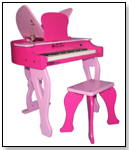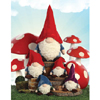|
|
American International Toy Fair: The Media Event of the Year 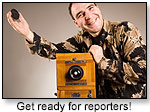 This will be my 18th year attending Toy Fair, so I was excited to be invited to share some insights with TDmonthly readers on how to maximize media opportunities at this very important show. February in New York is the perfect time to grab some publicity for your company. Because of the time of year in the media news cycle, and that the show is based in New York where so many of the most important media are based, media interaction is one of the most fundamental parts of the show for exhibitors. This will be my 18th year attending Toy Fair, so I was excited to be invited to share some insights with TDmonthly readers on how to maximize media opportunities at this very important show. February in New York is the perfect time to grab some publicity for your company. Because of the time of year in the media news cycle, and that the show is based in New York where so many of the most important media are based, media interaction is one of the most fundamental parts of the show for exhibitors. When toy companies exhibit at this show and succeed in gaining attention from key media (both trade and consumer), the opportunities started at Javits Convention Center then continue to develop all year long, culminating in a frenzy of holiday coverage in November and December. Provide Press Materials Prior to the Show The first big step to a successful media showing at Toy Fair is to provide all of the key trade magazines with properly labeled and sized photos and professionally written press releases on all new products and/or companies. Believe it or not, this process starts in November—months before the show—as many editorial deadlines are in December. Each publication has a specific format they like to receive their materials in, different deadlines, contacts, etc., and much of this changes each year. At KidStuff Public Relations, we verify all of this information in November and December so we have a solid game plan and timeline in place to maximize our clients’ coverage in the January pre-show and February show magazines. Allocate Advertising Dollars If you have the budget to advertise, coordinate which publications you’ll allocate ad dollars for and which products you’ll feature. Make sure they match what you submit to editorial. You do not need product or prototypes in hand to work with trade media—just great photography, all the key selling points, and pricing. 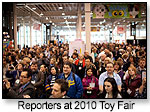 Reach Out to Consumers Reach Out to ConsumersIn January, when our clients are busy trying to book appointments with key sales managers and retailers, KidStuff PR publicists are busy re-purposing our trade outreach for consumer media, letting them know before the show what they’ll be seeing. Personalization to each outlet is key. There are several ways in which we work with media throughout the show and try to meet their unique needs. We create a master calendar to coordinate appointments and other media meetings, and staff the show accordingly. We know reporters are really busy during the show and are inundated with product pitches, so we try to make our pitches stand out, and try to make things as easy and efficient for reporters as possible. Get Noticed KidStuff PR typically has 16-19 clients at Toy Fair. One simple thing we do to help reporters is identify where each client is and their booth number with an easy-to-read 1-page floor plan of the show. We also hand them a colorful fact sheet with a brief client description, logo and website so reporters can investigate on their own. That way, if they prefer to walk the show alone without a publicist tagging along, they’ll know which booths are our clients’. Learn from other exhibitors' mistakes by watching expert Charles W Allen as he critiques different trade show booths in these videos. Recognize Reporters During the show, I’ve seen both extremes in exhibitor’s relations with the media. I’ve seen some that are so focused on selling that they’ll ignore or shun a reporter because they are busy meeting with a buyer. A better move is to pause your meeting and recognize the reporter with a smile, say you appreciate their interest and ask them if there’s any way they can come back a little later when you’re not busy. If you can specify a time, all the better. Collect Cards If they can’t come back, offer them your press kit, a sell sheet or a catalog, and ask if they can leave their card so you can get in touch after the show. Dedicate a basket or binder to press business cards so you can keep them organized. Jot a note on the back if there was a particular item they were interested in, and write down any deadlines for receiving information, a photo or sample. When you get home, write a note to everyone you spoke with and create a calendar to get each one what they need and when they need it. Prepare a Press Kit Have you heard of a press kit? Possibly. Do you know what should be in one? Probably not, unless you already have one and it’s good. Key components include press releases, a biography on key players in the company, a backgrounder explaining how the company got started and why, a fact sheet with all key information at a glance, and clippings of past trade and consumer coverage, if you have any. At KidStuff PR it’s a “living” document that changes throughout the year for our clients. It’s great if you have these components on your website so people can find them outside of the show. Every year, I survey our key reporter contacts to ask if this is the year they’ll give up paper press kits collected in a folder and go only electronic. Alas, that year has not come yet, although the quantity needed (and therefore expense of printing) is less, because some reporters can use electronic kits. Always have a small stack of your kits in your booth and offer to media visitors, and if they seem like they want one but don’t want to lug it, offer to mail it to them and include a personal note expressing thanks of interest. Time after time I have found this to be a much-appreciated and small gesture that will pay back dividends later. We also offer catalogs or marketing materials and the media usually want those, too. Keep Your Cool I’ve also seen the other extreme, where exhibitors will literally jump out in the aisle and grab a reporter and pull them into their booth. They’ve gotten good at spotting the color badge for media, and they can be annoying, if not downright scary, to reporters. Don’t be that person! 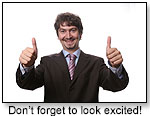 Act Excited Act ExcitedYear after year, I am surprised to see folks staffing booths who look bored. Whether it’s media or anyone else approaching your booth, for goodness’ sake look friendly and welcoming, dress professionally, and act like you’re glad to be there! I’m always horrified to see people with their head down and buried in a book, eating a messy lunch or avoiding eye contacts as people walk by. Guess what: A candy dish or small freebie does help draw people to your booth and lends a positive feeling to your products. Learn more about connecting with show attendees here. Get on TV You may hear something about Satellite Media Tours during Toy Fair. Offered by freelancers and media companies, these are paid opportunities to participate in TV coverage with a handful of other (usually non-competing) companies. If you have the budget for them, I do recommend them. They’re a great way to supplement your coverage at Toy Fair and you’ll learn a lot from them. (TDmonthly.com also has a video crew at Toy Fair, getting news coverage for our 14,600 registered retailer readers. Sign up for your video today.) Follow Up, Follow Up, Follow Up! I advise people to set their expectations appropriately (low) for orders at the show, and emphasize how important it is to allocate time, energy and money to diligent follow up in the weeks after the show to get the order. The same kind of follow up is extremely important with media. Both buyers and media are “shopping” the show for ideas. Some media provide immediate coverage of what they saw and loved at the show and some buyers come to the show prepared to write orders and have an organized open-to-buy budget. However, most buyers and media need time to decompress, process, organize, and sleep on it, to determine what items they really want to feature going forward. Learn more about the importance of following up with leads here. Remember to have fun, smile and work the room for not only orders but also press coverage. The work continues after the show when, happily, those orders and press clippings start to roll in. Good luck, and have a great show. Now that you know how to deal with the media at trade shows, learn more about selling to buyers in these articles from our Event Marketing Guru  Writer's Bio: President Lisa Orman established KidStuff Public Relations in 1994 out of her home near Madison, Wis. Orman used her past experiences as a writer for the Des Moines Register, Wall Street Journal, Newsweek and USA Today to give her a better understanding of when, why and how to successfully pitch to a reporter. She taps her experience in retail management consulting to help clients hone their messaging. Writer's Bio: President Lisa Orman established KidStuff Public Relations in 1994 out of her home near Madison, Wis. Orman used her past experiences as a writer for the Des Moines Register, Wall Street Journal, Newsweek and USA Today to give her a better understanding of when, why and how to successfully pitch to a reporter. She taps her experience in retail management consulting to help clients hone their messaging. She has been awarded much recognition in her field and in the industry, and is notably the only person to receive two Women In Toys awards: in 2008 for best Consultant, and in 2010 for Online Social Networker. Read more articles by this author |
| ||||||||||||||||||||||||||||||||
Disclaimer Privacy Policy Career Opportunities
Use of this site constitutes acceptance of our Terms of Use.
© Copyright 2025 PlayZak®, a division of ToyDirectory.com®, Inc.


